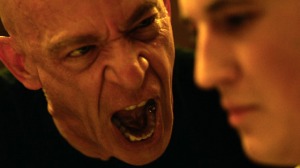Whiplash is about a lot of things, obsession, success and failure, fame, the strive to be the very best, motivation, competition. At its core, Whiplash is about a young man, Andrew (Miles Teller) struggling to achieve his goal of being one of the Jazz greats. His conductor, Fletcher (J.K. Simmons) is his mentor, but also his adversary.
At the crux of the movie, Fletcher tells Andrew, that you have to ‘push people beyond what’s expected of them.’ to get the very best out of people and that ‘there are no two words in the English language more harmful than good job.’ What Fletcher says rings true, his theory resonates, and comes full circle by the end of the movie, where his methods work, and Andrew performs beyond what Fletcher expects. But Fletcher’s methods are harsh and cruel, though you can’t help but realise that these methods may be the only option for unparalleled success.
But Fletcher’s mentoring of Andrew is never based on friendship, or a fondness, in fact it’s the opposite, it’s borne out of selfishness. Fletcher doesn’t want Andrew to become great just for Andrew’s own satisfaction, Fletcher wants to create success so that he can bask in the acclaim and accolade himself. In this, a situation is created in which Fletcher hates Andrew for not being able to become this bright, shooting star, and Andrew hates Fletcher for his resentments and for not appreciating Andrew’s visible talent. The relationship becomes quickly poisoned and Andrew and Fletcher become enemies.
Andrew, over the course of the film, moulds into Fletcher. He becomes selfish, cold, angry, all in the pursuit to become great. He decides that, to be the person he wants to be, he has to disregard his social responsibilities, friendships, love and focus only on the drums. Practice makes perfect, and so practice becomes life. But this intensity comes to a head at a big performance. Circumstances (waking up late, the car crash) have affected Andrew’s creation of perfection so that when he gets his big chance to show off, the ability to live up to his talents fleets him. Fletcher sees this as the final failure for Andrew, and an affirmation that Andrew is not his Charlie Parker. But in reality it’s a culmination of the self-fulling prophecy, in that Fletcher has created a pressure cyclone for Andrew to fail. The spark ignited when Fletcher first meets Andrew has burst into flames and consumed their relationship.
The separation happens, Fletcher caused Andrew’s downfall and so Andrew in turn causes Fletcher’s by reporting him to the school for the bullying and intimidating techniques Fletcher uses, which had been attributed in the suicide of one of his former students. They both end up with nothing. Andrew puts away his drumming, gets a job in a coffee shop and contemplates attempting to win back the girlfriend he discarded. Fletcher is reduced to guest appearances on the piano in small jazz clubs. But a chance meeting between the two reignites the spark. Fletcher invites Andrew to play the drums in his new band, a ruse meant to sabotage Andrew’s career once and for all. Andrew plays, and Fletcher’s ruse works. Andrew walks off the devastated that his one last chance to show that his is something special is gone. But he comes to the realisation that he is already at the bottom and that there will be no more opportunities, no other chances to show the world what he already knows. So he goes onto the stage and plays a drum solo that takes the power away from Fletcher. Fletcher attempts to regain control, but in front of an audience, is powerless. Andrew doing what he has never done before, disregards Fletcher, telling him ‘I’ll give the cue!’ and performing to the standard he has reached. Fletcher see’s this and acknowledges that Andrew is the star he always dreamed he would find.
End film. But there’s an unresolved issue clearly here though. These two evident narcissist, these antagonists, have succeeded. Both of them, in Andrew proving he is a star and Fletcher in finally being able to say that he has found his Charlie Parker. There is one ending, where you have both men hitting rock bottom, getting their just desserts, and looking like they are on the road to redemption. Then Director, Damien Chazelle snatches that ending away and creates another trigger moment between Andrew and Fletcher. This one with no ending in sight and no telling when the fallout will lead.
Dedication is needed to be the best, dedication and sacrifice. But Whiplash asks whether what that sacrifice takes out of you as a human being is ever worth it.


